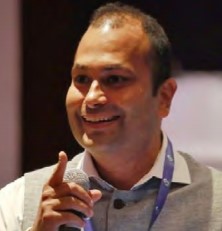
In conversation with Shaheem Rahiman, CEO Atria University
Today, there are humongous questions among a student’s mind after finishing off 12th. He/she thinks hard to understand their innate career interests. Only then, most look for a course and college. But, despite this better understanding of careers stimulated by the Internet wave, there are a few common questions that school-pass students look for. We have conversed with Shaheem Rahiman, CEO Atria University to gain some pre-college insights.
Q. How can students decide the course to take up after 12th grade?
Choosing courses or specializations right after class 12th, without exploring various interests, is an unfair ask. Torn between a sea of options, a majority of students either choose a stream that their parents prefer (for future earning potential) or pick courses popular in their peer groups.
This pressure around choosing without knowing ends up restricting the potential of students. And, they lose out on discovering a domain that truly inspires them. Students Astudent should nurture industryready skills should be able to explore a range of subjects to discover their true potential and interests before locking in on specialization and degree with absolute confidence. And, we need to create these flexible systems for our students.
Q.Internships plan the student’s career trajectory with absolute clarity and confidence
A university therefore should offer a flexible learning pathway where year 1 and 2 are really focused on providing learning opportunities for students. Students can discover a range of subjects in the first two years across our 5 futuristic domains, through courses and workshops. At the end of Year 2, they can be ready to choose a major-degree combination of their choice. This gives them adequate time and opportunity to explore all specializations before choosing an area of interest. This method of learning is practiced by eminent global institutes such as MIT. For instance, when you apply to MIT, you apply to the entire university, not to a specific major or school, so all first-year students begin MIT undeclared. This method of learning needs to become mainstream in India to empower young minds. And, help them prepare for a world that is changing every day.
Q. Why is Internship important for 12th students?
Internships are critical to helping students prepare for the real world. And, plan their career trajectory with absolute clarity and confidence. More importantly, internships ensure students are industry ready. Since industry-skills can’t be learned in classrooms or through books alone, it is essential for students to experience working in the real world, while they pursue an undergrad degree. Currently, there is a huge gap between skills needed for highquality jobs and industry-readiness for graduates. According to recent industry estimates, 15 lakh engineers graduate in India every year out of which only 2.5 lakh students land relevant jobs in technical domains. And, the lack of industryready skills is a significant contributor to the current status of employment across the industry. On an undergraduate level, academic institutes must collaborate with industry leaders to design curriculums that are more aligned to the real world.
Q. What are some essential skills to enter a college?
In today’s world, knowledge and technical skills are quickly rendered obsolete. It is important to not only focus on the fundamental skills and qualities while entering college but also hone those skills that will enable the student to thrive in the VUCA (Volatile Uncertain Complex and Ambiguous) world. We believe that an ability to learn new things, being open to new ideas, being collaborative, possessing good communication skills, and having a passion for making an impact in any field of choice is far more critical than scoring well on exams.
Q. Are there any common mistakes that students make?
If yes, what are they? Many students end up making bad career choices, unaligned to their interests, under parental or social pressure. Despite offbeat and unconventional courses available in the country, most students succumb to family compulsion to take up degrees/courses that are considered to be ‘financially safe’. A huge part of this is a lack of options to explore before choosing a career path. Academic institutes must involve parents actively during admission processes to create awareness around evolving academic and career pathways. And, encourage both parents and students to explore options meticulously before rushing into a degree that sparks no joy.






















































